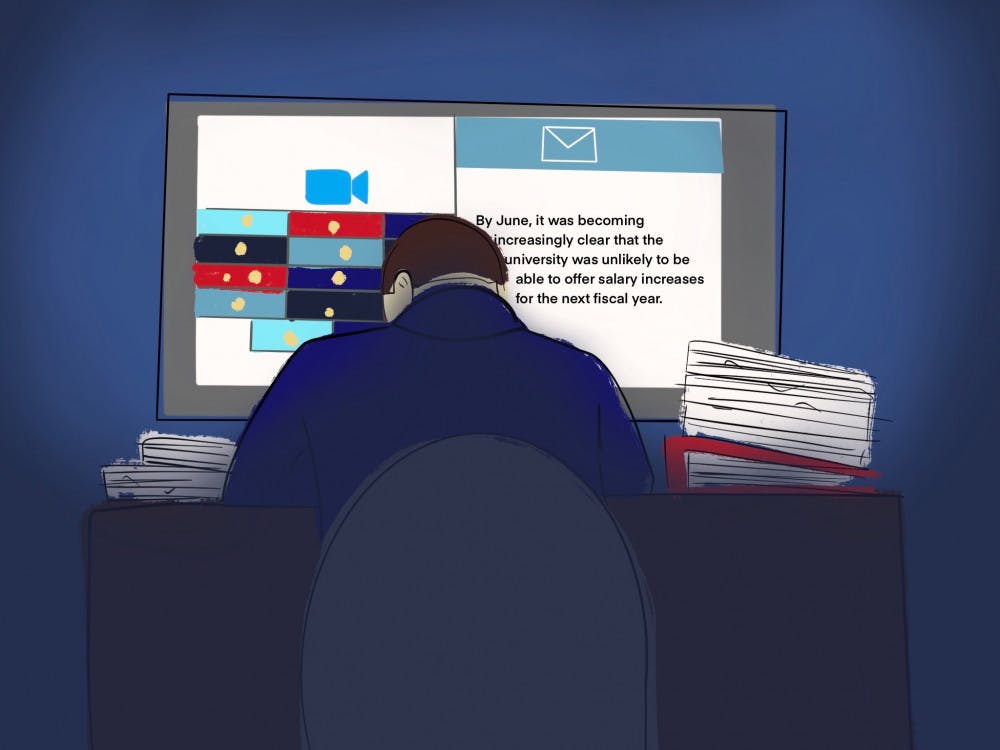Despite years of salary increases, UF will not be implementing any this year.
That’s placed faculty in a bind.
UF President Kent Fuchs stated during his State of the University address on Aug. 25 that, due to budget cuts incurred by the COVID-19 pandemic, the administration was forced to reconsider salary and wage increases for faculty and staff.
“Although we have worked hard to protect the jobs of our staff and faculty, it is unlikely we will be able to fund salary and wage increases this year,” Fuchs said.
Paul Ortiz, the president of UF’s United Faculty of Florida chapter and a UF history professor, looked at the lack of increases as a necessary evil. However, he would like the administration to consider faculty’s efforts to transition to remote learning.
“We’ve proven our commitment,” Ortiz said. “We would like them to respect our work and commitment to the university.”
UFF plans to negotiate salaries and furloughs with the administration over the Fall semester for the next fiscal year, Ortiz said. Until then, he believes salary increases are needed to solidify UF’s public school ranking.
“A good faith assumption is that UF is trying to make it into the top five universities,” Ortiz said. “To do that, your salary and compensation benefits for all staff has to be top five.”
William Connellan, an assistant provost and UF’s chief bargainer, said faculty members are just performing their regular duties.
“We’re not asking them to do extra work, we’re asking them to do their jobs,” he said. “And they’re doing it very well.”
UF’s reasoning for the absence of wage increases for the upcoming fiscal year is due to the state withholding 6% of UF’s funding, Fuchs said during his address. With the state allocating $775.7 million to UF in the 2019-2020 fiscal year, that amounts to more than $46.5 million in losses.
Fuchs also cited unexpected costs that came with the pandemic, including $15 million in personal protective equipment for students and faculty and $30 million in losses to UF enterprises like housing and performing arts.
To justify the lack of salary increases, William Keegan, UFF’s co-chief bargainer, sent a letter to Connellan on Aug. 21 inquiring about the current state of UF’s finances.
“We request supplementary documents to help us understand the university’s deliberative process and financial situation,” Keegan wrote.
However, the odds of a salary increase at all have been low.
Despite an April 2019 proposal to implement wage increases for the 2020-2021 academic year, UFF withdrew it last spring due to UF not being able to commit to a figure, citing financial stress due to COVID-19.
“By June it was becoming increasingly clear that the university was unlikely to be able to offer salary increases for the next fiscal year,” Steve Orlando, UF’s spokesperson, said in an email.
The salary portion of the union contract was finalized last June, leaving the issue “TBD” for the coming fiscal year, according to the contract.
Furloughs have also been a point of contention.
UF released a proposed memorandum on Aug. 23 to officially incorporate furloughs, though it hasn’t reached a final decision on the idea, Connellan said.
The issues add another wound to the battles between the two. UFF had been staunchly opposed to UF’s reopening plan, describing it in statements as “unacceptable and dangerous.”
The absence of wage increases also runs against the university’s position from 2019, where Fuchs introduced a pay program. It offered a 1% salary increase throughout the school and an additional 2% increase based on market and performance-based standards set by UF.
However, the union believes the lack of wage increases doesn’t reflect the added work faculty has had to do to shift their classes online.
“There should be a consideration to see how hard we’ve worked to reconfigure the way we teach,” Ortiz said.






